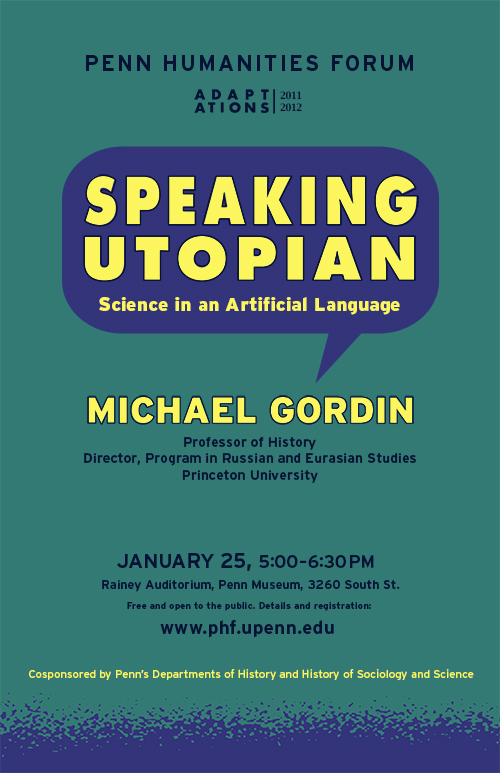By the turn of the 20th century, scientific knowledge was being produced in so many different national languages that individual scientists could no longer follow the important developments. Some thought the best way out of this linguistic logjam was to adapt one of the so-called "artificial languages," such as Esperanto, to the purposes of scientific communication. Award-winning historian Michael Gordin illuminates this curious moment of crisis and adaptation in the history of modern science.
Michael D. Gordin is a professor of history at Princeton University, where he teaches the history of modern science. He is also the Director of the Program in Russian and Eurasian Studies. He arrived at Princeton in 2003 after taking undergraduate and doctoral degrees from Harvard University and completing a term as a Junior Fellow at the Harvard Society of Fellows.
Gordin began his research as a historian of chemistry in late Imperial Russia, publishing A Well Ordered Thing: Dmitrii Mendeleev and the Shadow of the Periodic Table in 2004. It is the only book-length study in English of Mendeleev—most famous for his 1869 formulation of the periodic system of chemical elements—and it is the first study in any language to extensively employ Mendeleev’s voluminous personal archives. The book was awarded the Roy G. Neville Prize in Bibliography or Biography from the Chemical Heritage Foundation in November 2007.
He then turned to the early history of nuclear weapons, writing two books about the various ways in which scientists, politicians, and military officials thought about nuclear weapons, both in the United States and in the Soviet Union, before the meaning of those weapons stabilized into today’s recognizable form. The first of these books, Five Days in August: How World War II Became a Nuclear War (2007), explored the use of atomic bombs on Japan, and how those weapons were integrated into American military strategy and subsequently came to be understood as revolutionary weapons. The second, Red Cloud at Dawn: Truman, Stalin, and the End of the Atomic Monopoly (2009), traced the flows of information about nuclear weapons across the Iron Curtain in the late 1940s, with an emphasis on how the Americans and the Soviets learned about the scope of each other’s atomic programs.
Professor Gordin has two books scheduled for publication in 2012: a collaborative history (with five authors) of the scope of “rationality” during the Cold War; and a history of debates over the boundaries between science and pseudoscience from 1950 to 1980, with a particular emphasis on the debates over the historical and cosmological theories of Immanuel Velikovsky.
Recipient of a 2011-12 Guggenheim Fellowship, Gordin is currently pursuing research on the languages of science. Focusing specifically on chemistry over the last two centuries, he is investigating the transition from a polyglot scientific community (whose principal languages were English, French, and German) to a strikingly global monoglot science, which communicates almost entirely in English. He is particularly interested in the collapse of German as a language of chemistry, the rapid rise and gradual decline of Russian, and the scientific use of the artificial languages Esperanto and Ido.
Professor of History
Director, Program in Russian and Eurasian Studies
Princeton University



